外研版(2019)必修第三册Unit 5 What an adventure Starting Out & Understanding Ideas课件(共59张PPT)
文档属性
| 名称 | 外研版(2019)必修第三册Unit 5 What an adventure Starting Out & Understanding Ideas课件(共59张PPT) | 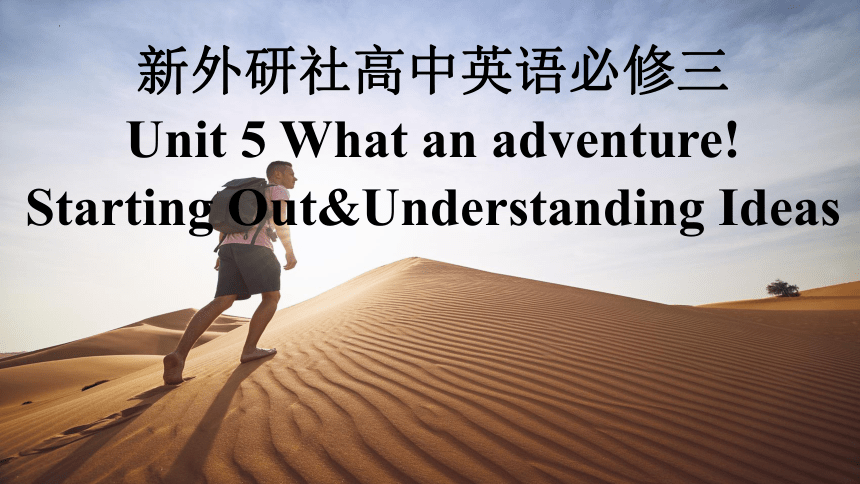 | |
| 格式 | pptx | ||
| 文件大小 | 7.3MB | ||
| 资源类型 | 教案 | ||
| 版本资源 | 外研版(2019) | ||
| 科目 | 英语 | ||
| 更新时间 | 2023-05-04 16:46:44 | ||
图片预览


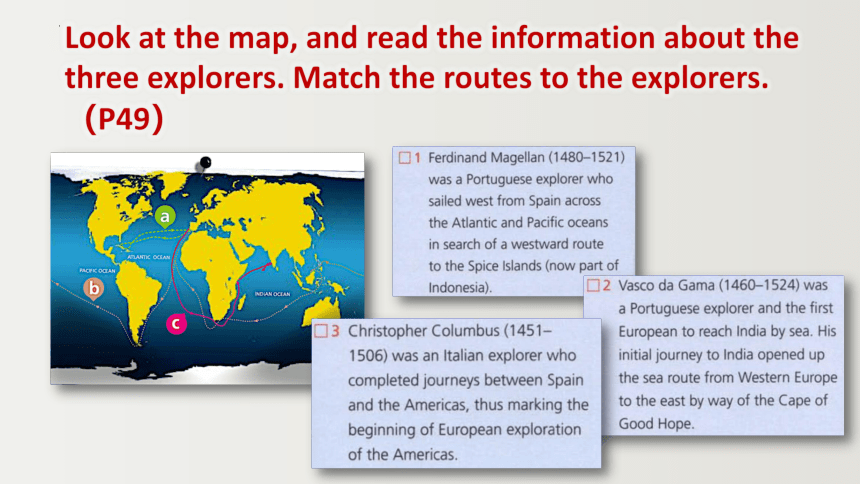
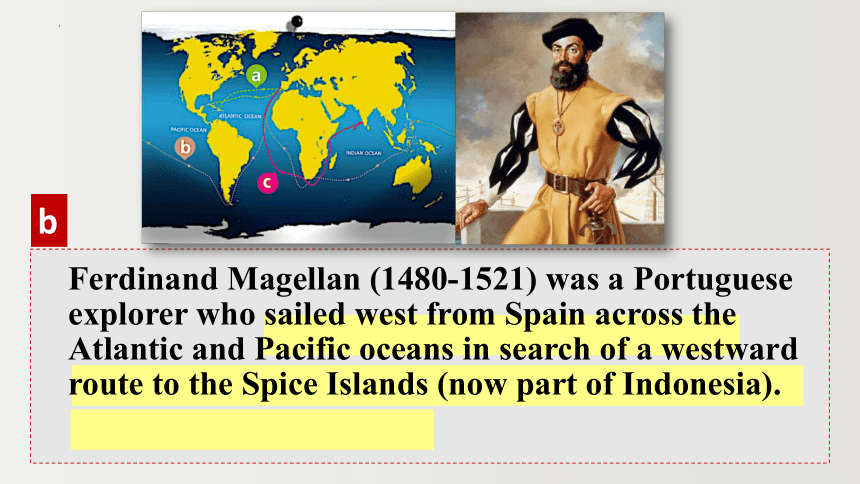
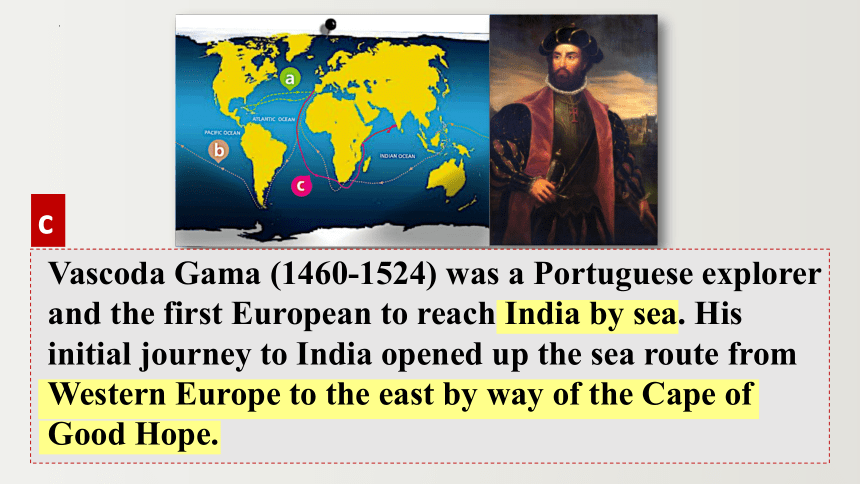
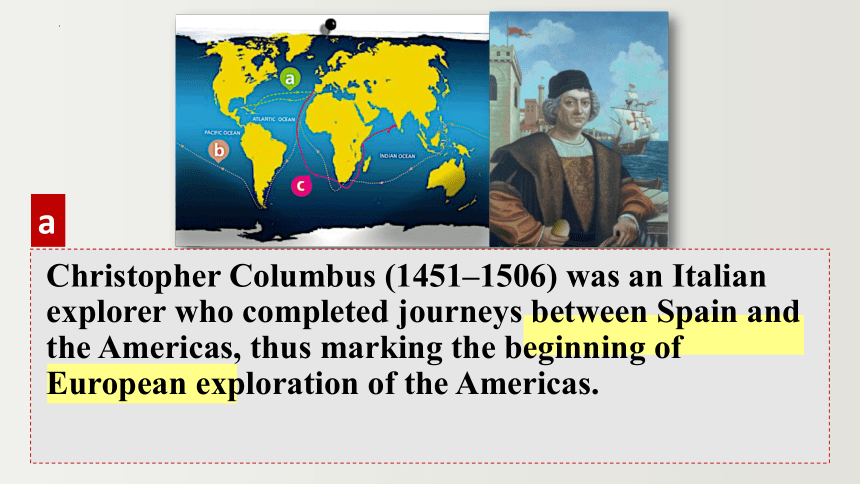
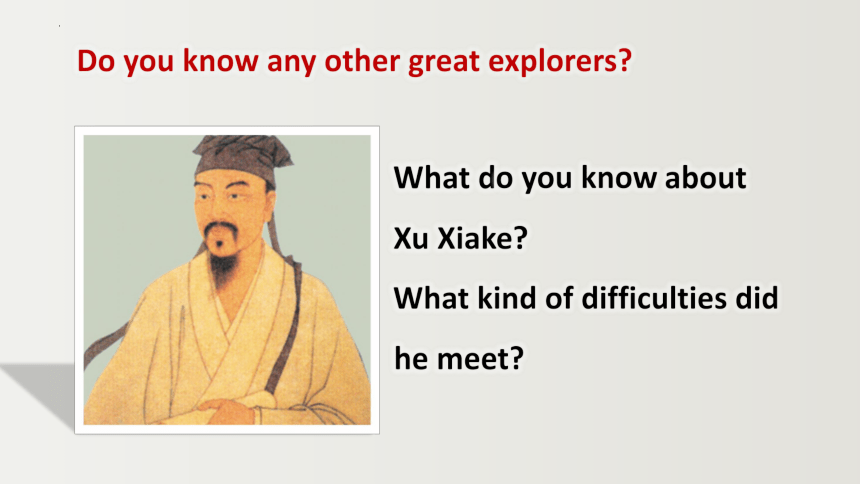
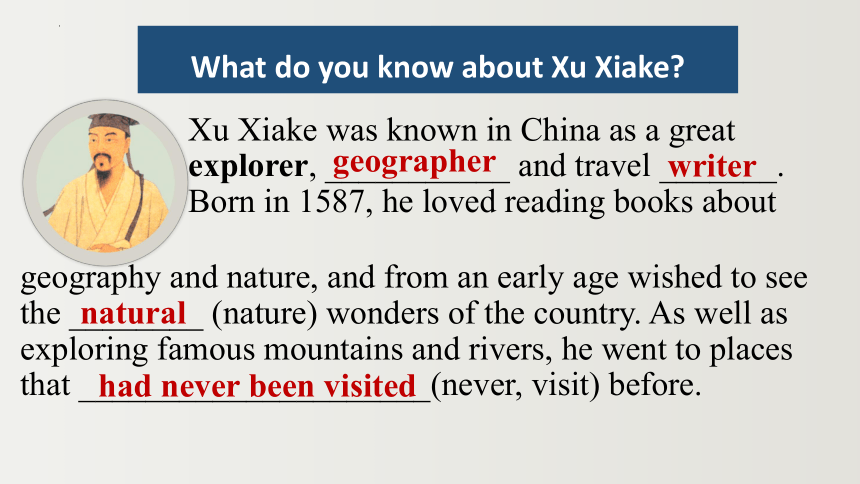
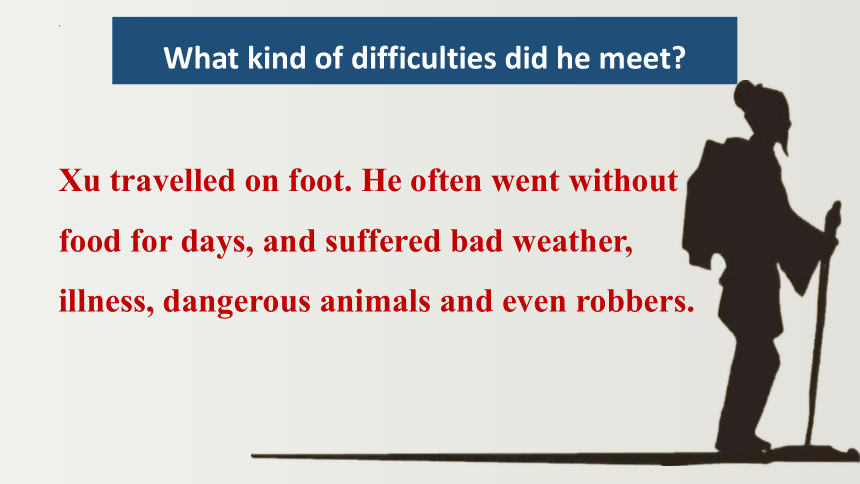
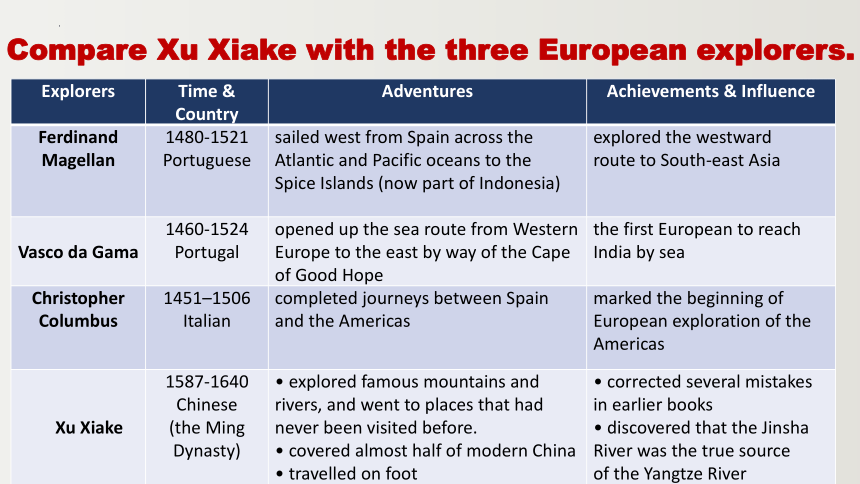
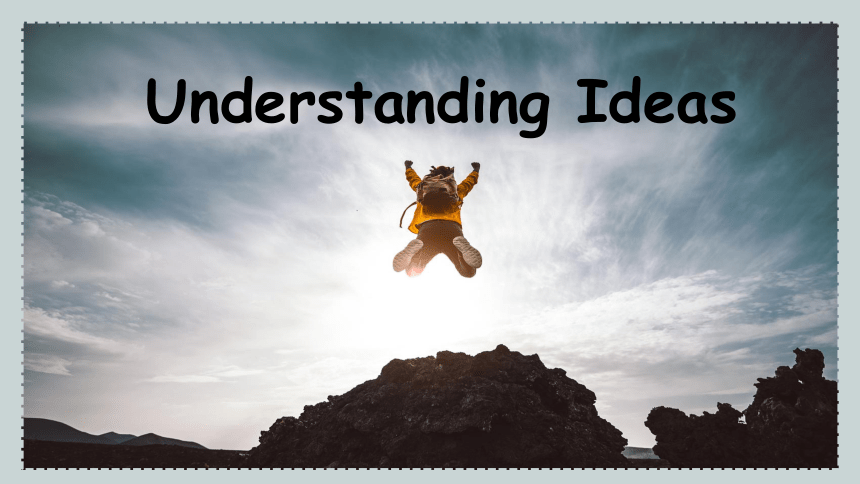

文档简介
(共59张PPT)
新外研社高中英语必修三
Unit 5 What an adventure!
Starting Out&Understanding Ideas
Starting Out
Look at the map, and read the information about the three explorers. Match the routes to the explorers. (P49)
b
Ferdinand Magellan (1480-1521) was a Portuguese explorer who sailed west from Spain across the Atlantic and Pacific oceans in search of a westward route to the Spice Islands (now part of Indonesia).
c
Vascoda Gama (1460-1524) was a Portuguese explorer and the first European to reach India by sea. His initial journey to India opened up the sea route from Western Europe to the east by way of the Cape of Good Hope.
a
Christopher Columbus (1451–1506) was an Italian explorer who completed journeys between Spain and the Americas, thus marking the beginning of European exploration of the Americas.
Do you know any other great explorers
What do you know about
Xu Xiake
What kind of difficulties did
he meet
Xu Xiake was known in China as a great explorer, ___________ and travel _______. Born in 1587, he loved reading books about
What do you know about Xu Xiake
geographer
writer
geography and nature, and from an early age wished to see the ________ (nature) wonders of the country. As well as exploring famous mountains and rivers, he went to places that _____________________(never, visit) before.
natural
had never been visited
What kind of difficulties did he meet
Xu travelled on foot. He often went without food for days, and suffered bad weather, illness, dangerous animals and even robbers.
Explorers Time & Country Adventures Achievements & Influence
Ferdinand Magellan 1480-1521 Portuguese sailed west from Spain across the Atlantic and Pacific oceans to the Spice Islands (now part of Indonesia) explored the westward
route to South-east Asia
Vasco da Gama 1460-1524 Portugal opened up the sea route from Western Europe to the east by way of the Cape of Good Hope the first European to reach
India by sea
Christopher Columbus 1451–1506 Italian completed journeys between Spain and the Americas marked the beginning of
European exploration of the
Americas
Xu Xiake 1587-1640 Chinese (the Ming Dynasty) explored famous mountains and rivers, and went to places that had never been visited before. covered almost half of modern China travelled on foot corrected several mistakes
in earlier books
discovered that the Jinsha
River was the true source
of the Yangtze River
Compare Xu Xiake with the three European explorers.
Understanding Ideas
Facts about Qomolangma
Qomolangma lies on the border of Nepal and the Tibet Autonomous Region of China.
The best time to climb Qomolangma is in April and May.
The temperature on the mountain can get as low as -60°C.
The first people confirmed to have reached the top were Edmund Hillary and Tenzing Norgay in 1953.
How high is the Qomolangma
How many camps are there along the route
What problems do you think the climber will face
Why the climbers need so many camps
What does the death zone mean
Read and answer following questions.
Read and answer following questions.
How high is the Qomolangma
How many camps are there along the route
What problems do you think the climber will face
Why the climbers need so many camps
What does the death zone mean
five
Out of energy
It’s extremely difficult and dangerous
Many people died there.
Low temperature
Lack of oxygen
8,844m
summit
n 顶点
8,848m
Choose the author’s purpose in writing the passage.
1. To encourage people to climb Qomolangma if fully prepared, as risks bring many benefits.
2. To remind people to balance the benefits and risks before deciding to climb Qomolangma.
3. To suggest that people stop taking risks and climbing Qomolangma, as the risks outweigh the benefits.
The risks
Para 2~3
Para 4~5
Para 6~7
Climbing Qomolangma: Worth the risks
The reasons
Conclusion
climbers
scientific reasons
Para 1
Read para 1 carefully and answer the two questions.
What are the risks of climbing Qomolangma
Why are many people willing to take the risks
unique
Climbers Name Reasons Result
What we get form this adventure is just _____We ______live to eat and make money. We eat and make money to_____. That is ____ and______ Sadly, Mallory would ________ although his body ________It is still not known if he_______
It brings into focus ______. It forces you to ________and figure out if you really have ______ He __________ Qomolangma _______ and ___________
Name:
Reasons: What we get form this adventure is just ___________We ______live to eat and make money. We eat and make money to __________________. That is ______________ and ___________
George Mallory
sheer joy
do not
be able to enjoy life
what life means
what life is for
Result: Sadly, Mallory would ________________________ although his body ______________
___________________
It is still not known if he ____________________________
_____________________________
die on the mountain in 1924
would not be
found until many years later
succeeded in reaching the top
of Qomolangma before it took his life
Name:
Reasons: It brings into focus ____________________ It forces you to ________________
and figure out if you really have ____________________________
_____________________________
__________
Alan Arnette
what’s important to you
look deep inside yourself
the physical, as well as mental
toughness to push when you want
to stop
Result: He __________ Qomolangma ________ and __________________________
_______________________
climbed
in 2011
was going to climb other high
mountains around the world
What do they have in common?
They did ________________________
They were willing to _____________ themselves and __________ risks.
what they wanted to do
challenge
take
Do you agree with their opinions Why
Think and share
Read para 4~5 carefully and answer the questions.
What is Type T personality
Who developed it
What will people with Type T personality do
and say
a strong feeling of excitement
兴奋
Read para 4~5 carefully and answer the questions.
What is Type T personality
Who developed it
What will people with Type T personality do
and say
Read para 4~5 carefully and answer the questions.
What is Type T personality
Who developed it
What will people with Type T personality do
and say
Los Angeles Times
洛杉矶时报
Read para 6~7 carefully and fill in the blank
Whether the benefits of climbing Qomolanga worth the risks is up to ______. Because yur desire to seek risks can be connected to ____________________________
_________
you
how much you expect to benefit from
the result
Do you know some Chinese climbers
What kind of personalities can we learn from
these climbers
Think and share
Language Points
Last year, hundreds of people spent good money on an experience that they knew would include crowds, discomfort and danger.
定从
spend time (in) doing sth./on sth. 花费时间做某事/在某事上
spend money (in) doing sth./on sth. 花费金钱做某事/在某事上
He spent 600 dollars ____ a new mobile phone.
He spent the evenings ______________(wash) the
windows and floors.
on
(in) washing
good money=
a great deal of money
(大价钱,相当多的钱)
crowd v.挤满,使...拥挤 n.人群,拥挤
crowd into 大批涌入……
crowd out 将……挤出,排挤
crowd in (on sb.) (问题或方法)涌上心头,涌入脑海
crowded adj.拥挤的,挤满的,充满的
be crowded with 挤满...;充满...
往事(memories)一齐涌上她的心头。
人们涌入那家新超市去抢购。
Memories came crowding into her mind / crowded in on her.
People crowded into the new supermarket to go shopping.
Last year, hundreds of people spent good money on an experience that they knew would include crowds, discomfort and danger.
Translation
去年,数百人在一种他们知道会有拥挤、不适和危险的体验上花了很多钱。
Many would become sick, due to the extreme cold and low air pressure, and a few would even lose their lives.
due to 因为,由于
lose one's life 丧命
Yet, despite all this, by the end of the trip many were already planning to return.
by the end of 到……结束时
plan to do sth. 计划做某事
at the end of 在…末;在…尽头(接时间/空间)
主句:一般过去时或一般将来时(接时间)
辨析
by the end of 在...前;到…为止(接时间)
主句:过去完成时或将来完成时
in the end 最后,终于(作状语)
= finally/at last
Examples
You can find the garden at the end of this road.
He parted with us at the end of the trip. 旅行结束时他和我们分手了
We'll have an exam in English at the end of May.
五月底我们要参加英语考试。
By the end of the holiday I had spent all my money.到假期结束时,我已经花光了自己所有的钱。
By the end of next year, we'll have finished the building. 到明年年底,我们将完成修建。
For these people, climbing Qomolangma is an experience like no other, making some feel weak and others, powerful.
现在分词短语作定语
like no other 独特的,独一无二的
Translation
对于这些人来说,攀登珠穆朗玛峰是一种与众不同的体验,让一些人感到虚弱,也让另一些人感到强大。
British mountain climber George Mallory wrote of climbing Qomolangma, “What we get from this adventure is just sheer joy... We do not live to eat and make money. We eat and make money to be able to enjoy life. That is what life means and what life is for.”
表语从句
表语从句
write of = write on/about 写(关于)
sheer adj. 纯粹的,十足的=pure, complete
make money=earn money (挣钱)
be able to do sth.有能力做某事
British mountain climber George Mallory wrote of climbing Qomolangma, “What we get from this adventure is just sheer joy... We do not live to eat and make money. We eat and make money to be able to enjoy life. That is what life means and what life is for.”
Translation
英国登山者乔治·马洛里在谈到攀登珠穆朗玛峰时写道:“我们从这次探险中得到的只是纯粹的快乐……我们活着不是为了吃饭和赚钱。我们吃饭和赚钱是为了享受生活。这就是生活的意义和目的。”
Sadly, Mallory would die on the mountain in 1924, although his body would not be found until many years later.
直到老师进来学生们才停止讲话。
Not until the teacher came in did the students stop talking.
It was not until the teacher came in that the students stopped talking.
(倒装句)
(强调句)
not until的倒装:not until位于句首时,主句倒装,
结构:Not until+从句+倒装的主句
not until的强调:It is/was not until... that...
Sadly, Mallory would die on the mountain in 1924, although his body would not be found until many years later.
Translation
遗憾的是,马洛里于1924年死在了山上,他的遗体直到多年以后才被发现。
It is still not known if he succeeded in reaching the top of Qomolangma before it took his life.
if引导的句子为真正主语
形式主语
时间状语从句
succeed in doing sth.成功地做某事
the top of 在...的顶部/端
take one's life 夺去某人的生命
Translation
至今尚不清楚他是否在遇难前成功登顶珠穆朗玛峰。
In 2011, words similar to those of Mallory were spoken by American mountain climber Alan Arnette, who climbed Qomolangma in that year and was going to climb other high mountains around the world.
定从
(be) similar to 与……相似
be similar in 在……方面相似
Translation
2011年,美国登山者艾伦·阿内特说了一些与马洛里类似的话。那年,阿内特登上了珠穆朗玛峰,并打算登上世界各地的其他高山。
“It brings into focus what’s important to you.”
宾从
bring...into focus 使……成为焦点
宾语太长,后置
It brings what’s important to you into focus.
Translation
它会让你关注对你来说重要的事情。
“There are a thousand reasons to turn around and only one to keep going. You really have to focus on the one reason that’s most important and unique to you. It forces you to look deep inside yourself and figure out if you really have the physical, as well as mental, toughness to push when you want to stop.”
turn around 转身
keep doing 坚持做(困难的事)
focus on 集中注意力于……
be unique to sb.是某人所特有的
force sb.to do sth.迫使某人做某事
figure out 弄清楚,弄明白
as well as 也,和
toughness n.韧性
“There are a thousand reasons to turn around and only one to keep going. You really have to focus on the one reason that’s most important and unique to you. It forces you to look deep inside yourself and figure out if you really have the physical, as well as mental, toughness to push when you want to stop.”
Translation
即使有一千个转身的理由,但总有一个坚持下去的理由。你必须专注于一个对你来说最重要、最独特的理由。当你想停下来的时候,它迫使你审视自己的内心深处,弄清楚你是否真的有足够的体力、脑力和韧性去继续前行。
With the majority of attempts to climb Qomolangma resulting either in total success or failure, is there also a scientific reason behind this risk-taking
the majority of 大多数的
with的复合结构
The old man walked with a stick in his hand.
He just sat there with his mouth open.
He fell asleep with the light on.
With so many people watching her, she felt at a loss.
He stood for an instant with his hand raised.
With so much homework to do, the boy can't watch TV.
Examples
attempt n.努力,尝试 v.尝试,企图
attempt to do sth. 努力做某事;试图做某事
make an attempt to do sth. 试图做某事
attempted adj.(犯罪等)未遂的
failure n.失败;失败的人或事物
fail vt.&vi. 失败;未能(做到)
fail in(doing) sth.在……方面失败了
fail to do sth.未能做某事
failure作“失败”讲时,为抽象名词,用作不可数名词;但作“失败的人或事”讲时,用作可数名词,这种用法叫抽象名词具体化。
常见的抽象名词具体化的单词:
beauty 美,美丽[U] a beauty 美人,美丽的东西[C]
experience 经验[U] an experience 一次经历[C]
surprise 吃惊,惊奇[U] a surprise 令人吃惊的人或事[C]
pleasure 愉快,高兴[U] a pleasure 一个乐事,一个乐趣[C]
success 成功[U] a success 一个成功的人或一件成功的事[C]
danger 危险[U] a danger 可能引起危险的人或物[C]
With the majority of attempts to climb Qomolangma resulting either in total success or failure, is there also a scientific reason behind this risk-taking
Translation
大多数攀登珠穆朗玛峰的尝试要么完全成功,要么彻底失败,在这种冒险行为背后是否有科学依据?
Recent studies indicate that risk-taking may be part of human nature, with some of us more likely to take risks than others.
part of... ……的一部分
human nature 人性,人的天性
(be) likely to do sth. 可能做某事
take risks 冒险
宾从
Translation
最近的研究表明,冒险可能是人类天性的一部分,我们中的一些人比其他人更有可能冒险。
Psychologist Frank Farley has spent years studying people who jump out of planes and drive fast cars, as well as those who climb Qomolangma.
定从
Translation
心理学家弗兰克·法利多年来一直在研究高空跳伞、开快车和攀登珠穆朗玛峰的人。
He refers to the personalities of these people as “Type T”, with the “T” standing for “thrill”.
refer to...as... 把……称为……
stand for 代表
thrill n. 惊险,刺激
refer to 参考, 查阅; 提到, 谈到; 涉及; 指的是
reference 参考,查阅; 提到,谈到
Examples
The expert spoke for an hour without referring to her notes.专家讲了一个小时,一次都没看她的笔记。
I believe Frank wasn’t referring to me when he said someone was not careful. 我相信弗兰克说有人不小心时并不是指我。
In Peter’s speech, he referred to a recent trip to Canada. 在彼得的演讲中,他提到了最近一次加拿大之行。
The new law does not refer to land used for farming. 新法与耕地无关。
Speaking to the LA Times about the “Type T” personalities, Farley said, “They’ll say, ‘I’m not taking risks, I’m an expert...’ They don’t want to die and they don’t expect to die.”
expect to do sth. 预料做某事
Translation
法利在接受《洛杉矶时报》采访时谈到了“T型”人格。“他们会说, ‘我不是在冒险,我是专家……’他们不想死,也没料到会死。”
Research also suggests that our desire to seek risks can be connected to how much we expect to benefit from the result.
be connected to 与……有关
benefit from 受益于,得益于
suggest v. 表明,暗示 (其后的宾语从句不用虚拟语气)
suggest 表“建议”时,其后的宾语从句用虚拟语气
e.g. I suggest that she (should) go there at once.
17. With this in mind, are the benefits of climbing Qomolangma worth the risks It’s totally up to you.
with... in mind 考虑到……
be up to sb. 由某人决定
新外研社高中英语必修三
Unit 5 What an adventure!
Starting Out&Understanding Ideas
Starting Out
Look at the map, and read the information about the three explorers. Match the routes to the explorers. (P49)
b
Ferdinand Magellan (1480-1521) was a Portuguese explorer who sailed west from Spain across the Atlantic and Pacific oceans in search of a westward route to the Spice Islands (now part of Indonesia).
c
Vascoda Gama (1460-1524) was a Portuguese explorer and the first European to reach India by sea. His initial journey to India opened up the sea route from Western Europe to the east by way of the Cape of Good Hope.
a
Christopher Columbus (1451–1506) was an Italian explorer who completed journeys between Spain and the Americas, thus marking the beginning of European exploration of the Americas.
Do you know any other great explorers
What do you know about
Xu Xiake
What kind of difficulties did
he meet
Xu Xiake was known in China as a great explorer, ___________ and travel _______. Born in 1587, he loved reading books about
What do you know about Xu Xiake
geographer
writer
geography and nature, and from an early age wished to see the ________ (nature) wonders of the country. As well as exploring famous mountains and rivers, he went to places that _____________________(never, visit) before.
natural
had never been visited
What kind of difficulties did he meet
Xu travelled on foot. He often went without food for days, and suffered bad weather, illness, dangerous animals and even robbers.
Explorers Time & Country Adventures Achievements & Influence
Ferdinand Magellan 1480-1521 Portuguese sailed west from Spain across the Atlantic and Pacific oceans to the Spice Islands (now part of Indonesia) explored the westward
route to South-east Asia
Vasco da Gama 1460-1524 Portugal opened up the sea route from Western Europe to the east by way of the Cape of Good Hope the first European to reach
India by sea
Christopher Columbus 1451–1506 Italian completed journeys between Spain and the Americas marked the beginning of
European exploration of the
Americas
Xu Xiake 1587-1640 Chinese (the Ming Dynasty) explored famous mountains and rivers, and went to places that had never been visited before. covered almost half of modern China travelled on foot corrected several mistakes
in earlier books
discovered that the Jinsha
River was the true source
of the Yangtze River
Compare Xu Xiake with the three European explorers.
Understanding Ideas
Facts about Qomolangma
Qomolangma lies on the border of Nepal and the Tibet Autonomous Region of China.
The best time to climb Qomolangma is in April and May.
The temperature on the mountain can get as low as -60°C.
The first people confirmed to have reached the top were Edmund Hillary and Tenzing Norgay in 1953.
How high is the Qomolangma
How many camps are there along the route
What problems do you think the climber will face
Why the climbers need so many camps
What does the death zone mean
Read and answer following questions.
Read and answer following questions.
How high is the Qomolangma
How many camps are there along the route
What problems do you think the climber will face
Why the climbers need so many camps
What does the death zone mean
five
Out of energy
It’s extremely difficult and dangerous
Many people died there.
Low temperature
Lack of oxygen
8,844m
summit
n 顶点
8,848m
Choose the author’s purpose in writing the passage.
1. To encourage people to climb Qomolangma if fully prepared, as risks bring many benefits.
2. To remind people to balance the benefits and risks before deciding to climb Qomolangma.
3. To suggest that people stop taking risks and climbing Qomolangma, as the risks outweigh the benefits.
The risks
Para 2~3
Para 4~5
Para 6~7
Climbing Qomolangma: Worth the risks
The reasons
Conclusion
climbers
scientific reasons
Para 1
Read para 1 carefully and answer the two questions.
What are the risks of climbing Qomolangma
Why are many people willing to take the risks
unique
Climbers Name Reasons Result
What we get form this adventure is just _____We ______live to eat and make money. We eat and make money to_____. That is ____ and______ Sadly, Mallory would ________ although his body ________It is still not known if he_______
It brings into focus ______. It forces you to ________and figure out if you really have ______ He __________ Qomolangma _______ and ___________
Name:
Reasons: What we get form this adventure is just ___________We ______live to eat and make money. We eat and make money to __________________. That is ______________ and ___________
George Mallory
sheer joy
do not
be able to enjoy life
what life means
what life is for
Result: Sadly, Mallory would ________________________ although his body ______________
___________________
It is still not known if he ____________________________
_____________________________
die on the mountain in 1924
would not be
found until many years later
succeeded in reaching the top
of Qomolangma before it took his life
Name:
Reasons: It brings into focus ____________________ It forces you to ________________
and figure out if you really have ____________________________
_____________________________
__________
Alan Arnette
what’s important to you
look deep inside yourself
the physical, as well as mental
toughness to push when you want
to stop
Result: He __________ Qomolangma ________ and __________________________
_______________________
climbed
in 2011
was going to climb other high
mountains around the world
What do they have in common?
They did ________________________
They were willing to _____________ themselves and __________ risks.
what they wanted to do
challenge
take
Do you agree with their opinions Why
Think and share
Read para 4~5 carefully and answer the questions.
What is Type T personality
Who developed it
What will people with Type T personality do
and say
a strong feeling of excitement
兴奋
Read para 4~5 carefully and answer the questions.
What is Type T personality
Who developed it
What will people with Type T personality do
and say
Read para 4~5 carefully and answer the questions.
What is Type T personality
Who developed it
What will people with Type T personality do
and say
Los Angeles Times
洛杉矶时报
Read para 6~7 carefully and fill in the blank
Whether the benefits of climbing Qomolanga worth the risks is up to ______. Because yur desire to seek risks can be connected to ____________________________
_________
you
how much you expect to benefit from
the result
Do you know some Chinese climbers
What kind of personalities can we learn from
these climbers
Think and share
Language Points
Last year, hundreds of people spent good money on an experience that they knew would include crowds, discomfort and danger.
定从
spend time (in) doing sth./on sth. 花费时间做某事/在某事上
spend money (in) doing sth./on sth. 花费金钱做某事/在某事上
He spent 600 dollars ____ a new mobile phone.
He spent the evenings ______________(wash) the
windows and floors.
on
(in) washing
good money=
a great deal of money
(大价钱,相当多的钱)
crowd v.挤满,使...拥挤 n.人群,拥挤
crowd into 大批涌入……
crowd out 将……挤出,排挤
crowd in (on sb.) (问题或方法)涌上心头,涌入脑海
crowded adj.拥挤的,挤满的,充满的
be crowded with 挤满...;充满...
往事(memories)一齐涌上她的心头。
人们涌入那家新超市去抢购。
Memories came crowding into her mind / crowded in on her.
People crowded into the new supermarket to go shopping.
Last year, hundreds of people spent good money on an experience that they knew would include crowds, discomfort and danger.
Translation
去年,数百人在一种他们知道会有拥挤、不适和危险的体验上花了很多钱。
Many would become sick, due to the extreme cold and low air pressure, and a few would even lose their lives.
due to 因为,由于
lose one's life 丧命
Yet, despite all this, by the end of the trip many were already planning to return.
by the end of 到……结束时
plan to do sth. 计划做某事
at the end of 在…末;在…尽头(接时间/空间)
主句:一般过去时或一般将来时(接时间)
辨析
by the end of 在...前;到…为止(接时间)
主句:过去完成时或将来完成时
in the end 最后,终于(作状语)
= finally/at last
Examples
You can find the garden at the end of this road.
He parted with us at the end of the trip. 旅行结束时他和我们分手了
We'll have an exam in English at the end of May.
五月底我们要参加英语考试。
By the end of the holiday I had spent all my money.到假期结束时,我已经花光了自己所有的钱。
By the end of next year, we'll have finished the building. 到明年年底,我们将完成修建。
For these people, climbing Qomolangma is an experience like no other, making some feel weak and others, powerful.
现在分词短语作定语
like no other 独特的,独一无二的
Translation
对于这些人来说,攀登珠穆朗玛峰是一种与众不同的体验,让一些人感到虚弱,也让另一些人感到强大。
British mountain climber George Mallory wrote of climbing Qomolangma, “What we get from this adventure is just sheer joy... We do not live to eat and make money. We eat and make money to be able to enjoy life. That is what life means and what life is for.”
表语从句
表语从句
write of = write on/about 写(关于)
sheer adj. 纯粹的,十足的=pure, complete
make money=earn money (挣钱)
be able to do sth.有能力做某事
British mountain climber George Mallory wrote of climbing Qomolangma, “What we get from this adventure is just sheer joy... We do not live to eat and make money. We eat and make money to be able to enjoy life. That is what life means and what life is for.”
Translation
英国登山者乔治·马洛里在谈到攀登珠穆朗玛峰时写道:“我们从这次探险中得到的只是纯粹的快乐……我们活着不是为了吃饭和赚钱。我们吃饭和赚钱是为了享受生活。这就是生活的意义和目的。”
Sadly, Mallory would die on the mountain in 1924, although his body would not be found until many years later.
直到老师进来学生们才停止讲话。
Not until the teacher came in did the students stop talking.
It was not until the teacher came in that the students stopped talking.
(倒装句)
(强调句)
not until的倒装:not until位于句首时,主句倒装,
结构:Not until+从句+倒装的主句
not until的强调:It is/was not until... that...
Sadly, Mallory would die on the mountain in 1924, although his body would not be found until many years later.
Translation
遗憾的是,马洛里于1924年死在了山上,他的遗体直到多年以后才被发现。
It is still not known if he succeeded in reaching the top of Qomolangma before it took his life.
if引导的句子为真正主语
形式主语
时间状语从句
succeed in doing sth.成功地做某事
the top of 在...的顶部/端
take one's life 夺去某人的生命
Translation
至今尚不清楚他是否在遇难前成功登顶珠穆朗玛峰。
In 2011, words similar to those of Mallory were spoken by American mountain climber Alan Arnette, who climbed Qomolangma in that year and was going to climb other high mountains around the world.
定从
(be) similar to 与……相似
be similar in 在……方面相似
Translation
2011年,美国登山者艾伦·阿内特说了一些与马洛里类似的话。那年,阿内特登上了珠穆朗玛峰,并打算登上世界各地的其他高山。
“It brings into focus what’s important to you.”
宾从
bring...into focus 使……成为焦点
宾语太长,后置
It brings what’s important to you into focus.
Translation
它会让你关注对你来说重要的事情。
“There are a thousand reasons to turn around and only one to keep going. You really have to focus on the one reason that’s most important and unique to you. It forces you to look deep inside yourself and figure out if you really have the physical, as well as mental, toughness to push when you want to stop.”
turn around 转身
keep doing 坚持做(困难的事)
focus on 集中注意力于……
be unique to sb.是某人所特有的
force sb.to do sth.迫使某人做某事
figure out 弄清楚,弄明白
as well as 也,和
toughness n.韧性
“There are a thousand reasons to turn around and only one to keep going. You really have to focus on the one reason that’s most important and unique to you. It forces you to look deep inside yourself and figure out if you really have the physical, as well as mental, toughness to push when you want to stop.”
Translation
即使有一千个转身的理由,但总有一个坚持下去的理由。你必须专注于一个对你来说最重要、最独特的理由。当你想停下来的时候,它迫使你审视自己的内心深处,弄清楚你是否真的有足够的体力、脑力和韧性去继续前行。
With the majority of attempts to climb Qomolangma resulting either in total success or failure, is there also a scientific reason behind this risk-taking
the majority of 大多数的
with的复合结构
The old man walked with a stick in his hand.
He just sat there with his mouth open.
He fell asleep with the light on.
With so many people watching her, she felt at a loss.
He stood for an instant with his hand raised.
With so much homework to do, the boy can't watch TV.
Examples
attempt n.努力,尝试 v.尝试,企图
attempt to do sth. 努力做某事;试图做某事
make an attempt to do sth. 试图做某事
attempted adj.(犯罪等)未遂的
failure n.失败;失败的人或事物
fail vt.&vi. 失败;未能(做到)
fail in(doing) sth.在……方面失败了
fail to do sth.未能做某事
failure作“失败”讲时,为抽象名词,用作不可数名词;但作“失败的人或事”讲时,用作可数名词,这种用法叫抽象名词具体化。
常见的抽象名词具体化的单词:
beauty 美,美丽[U] a beauty 美人,美丽的东西[C]
experience 经验[U] an experience 一次经历[C]
surprise 吃惊,惊奇[U] a surprise 令人吃惊的人或事[C]
pleasure 愉快,高兴[U] a pleasure 一个乐事,一个乐趣[C]
success 成功[U] a success 一个成功的人或一件成功的事[C]
danger 危险[U] a danger 可能引起危险的人或物[C]
With the majority of attempts to climb Qomolangma resulting either in total success or failure, is there also a scientific reason behind this risk-taking
Translation
大多数攀登珠穆朗玛峰的尝试要么完全成功,要么彻底失败,在这种冒险行为背后是否有科学依据?
Recent studies indicate that risk-taking may be part of human nature, with some of us more likely to take risks than others.
part of... ……的一部分
human nature 人性,人的天性
(be) likely to do sth. 可能做某事
take risks 冒险
宾从
Translation
最近的研究表明,冒险可能是人类天性的一部分,我们中的一些人比其他人更有可能冒险。
Psychologist Frank Farley has spent years studying people who jump out of planes and drive fast cars, as well as those who climb Qomolangma.
定从
Translation
心理学家弗兰克·法利多年来一直在研究高空跳伞、开快车和攀登珠穆朗玛峰的人。
He refers to the personalities of these people as “Type T”, with the “T” standing for “thrill”.
refer to...as... 把……称为……
stand for 代表
thrill n. 惊险,刺激
refer to 参考, 查阅; 提到, 谈到; 涉及; 指的是
reference 参考,查阅; 提到,谈到
Examples
The expert spoke for an hour without referring to her notes.专家讲了一个小时,一次都没看她的笔记。
I believe Frank wasn’t referring to me when he said someone was not careful. 我相信弗兰克说有人不小心时并不是指我。
In Peter’s speech, he referred to a recent trip to Canada. 在彼得的演讲中,他提到了最近一次加拿大之行。
The new law does not refer to land used for farming. 新法与耕地无关。
Speaking to the LA Times about the “Type T” personalities, Farley said, “They’ll say, ‘I’m not taking risks, I’m an expert...’ They don’t want to die and they don’t expect to die.”
expect to do sth. 预料做某事
Translation
法利在接受《洛杉矶时报》采访时谈到了“T型”人格。“他们会说, ‘我不是在冒险,我是专家……’他们不想死,也没料到会死。”
Research also suggests that our desire to seek risks can be connected to how much we expect to benefit from the result.
be connected to 与……有关
benefit from 受益于,得益于
suggest v. 表明,暗示 (其后的宾语从句不用虚拟语气)
suggest 表“建议”时,其后的宾语从句用虚拟语气
e.g. I suggest that she (should) go there at once.
17. With this in mind, are the benefits of climbing Qomolangma worth the risks It’s totally up to you.
with... in mind 考虑到……
be up to sb. 由某人决定
